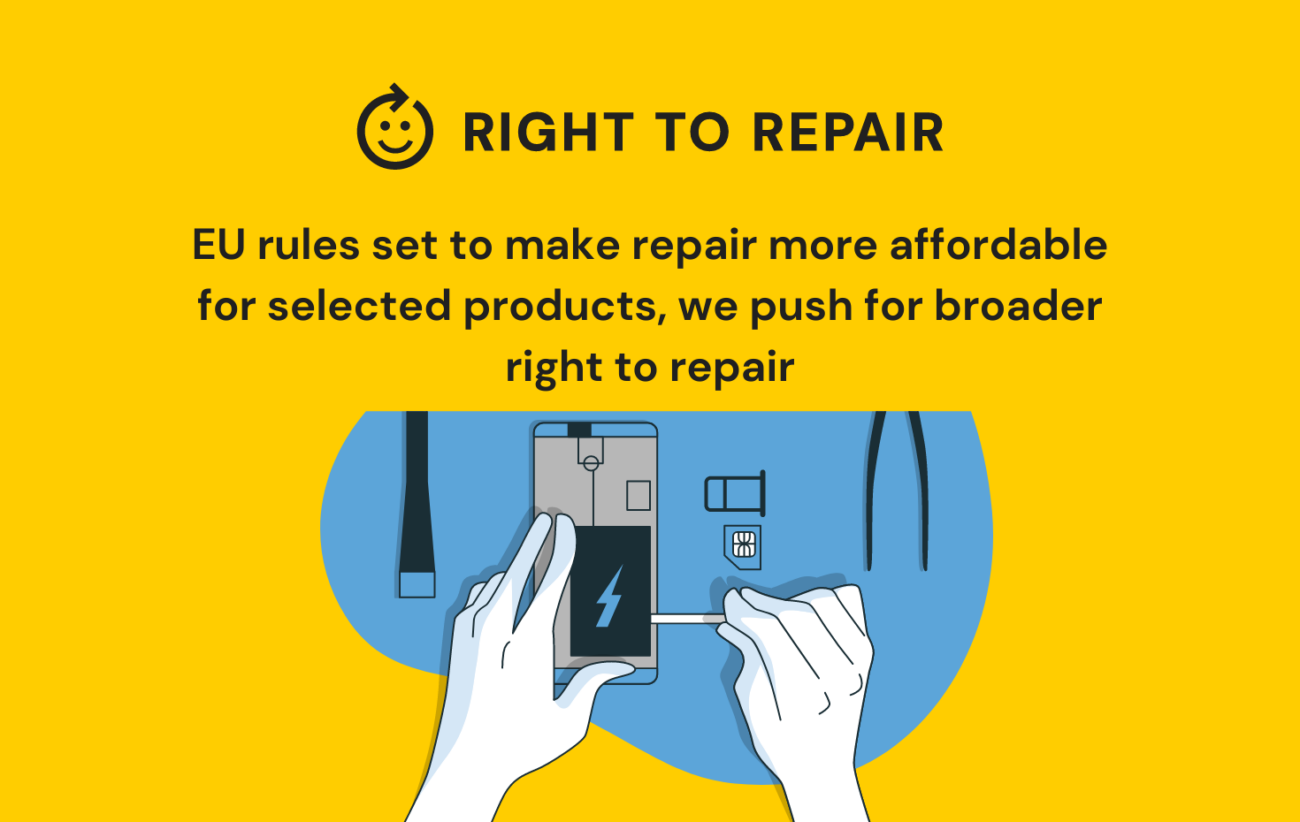
The Right to Repair Europe coalition, representing more than 130 organisations, celebrates that European consumers will get better access to affordable repairs for selected products, but urges for more wide ranging rules.
On Thursday, EU lawmakers reached a deal on new repair rules. In a leap forward, the new law supports independent repair and improves consumers’ access to affordable repair options, by introducing rules for reasonable prices for original parts as well as banning software practices which prevent independent repair and the use of compatible and reused spare parts. Campaigners applaud this as a step in the right direction for affordable repair.
However, this rule is only applicable to products for which the EU legislation lays down reparability requirements [2]. For these few product categories, producers will for the first time be obliged to offer repair options beyond the legal guarantee period of two years. Right to Repair Europe demands a broader right to repair legislation covering more product categories during the next mandate. Regrettably, the current law also fails to offer broader access to more repair information and more spare parts, and to prioritise repair within the legal guarantee framework.
The EU Commission will introduce a European online platform listing repair and buyback solutions in Member States and harmonised quote/estimations, which will increase the visibility of repair options and transparency for their costs. EU lawmakers also encourage Member States to introduce repair funds and vouchers, which have proven successful as a viable strategy to improve repair affordability. Furthermore, small steps were taken to make repair under guarantee more attractive.
Smaller wins with smaller impacts
The new law mandates sellers to propose repairs if products fail during the legal guarantee period, accompanied by a one-year extension of the guarantee after repair. While positively received, the incentive might still be perceived as inferior next to the offer of replacements. We would have preferred a requirement to repair products within the legal guarantee to reduce unnecessary waste.
The EU Commission will establish an online platform helping consumers locate nearby repair options, amplifying repair visibility.
Upon consumer’s request, repairers may choose to submit a harmonised repair quote/estimation called the “European Repair Information Form”, including binding information such as the type or repair suggested and its price or, if the precise cost cannot be calculated, the applicable calculation method and maximum price of repair.
Right to Repair Europe will follow-up with a more detailed analysis of the measures once we have access to the legal text approved.
Cristina Ganapini, Coordinator of the Right to Repair Europe coalition, said: “The promising steps towards affordable repairs are a victory for our coalition representing the future of the European repair economy. This is not without thanks to the EU Parliament, particularly MEP René Repasi’s tireless efforts against pushbacks. The next EU Commission must pick up the baton and keep working on ecodesign to secure repairability rules for more products, while national governments must introduce repair funds.”
Marie Castelli, Head of Public affairs of Back Market, said :
“Putting an end to manufacturers’ techniques preventing independent repair and refurbishment is a huge step forward in the building of a more circular economy in the EU. By opening the after sales markets on the products covered, this text will allow consumers to access quality affordable repair. We now need to extend this freedom to repair to as many products as possible. We count on the next mandate to have an ambitious ecodesign work plan on electronics, which is the fastest growing waste stream”.
Mathieu Rama, Senior Programme Manager at ECOS, said:
“The blight of e-waste must be stopped, so every step towards easily repairable electronic products is a win for the environment. With more reasonable spare parts prices and improved access to independent repair, we are heading in the right direction – but this directive is not enough. It covers only a small group of products – many more must still be brought under the ecodesign umbrella before we can really speak about a universal right to repair.”
[2] The product groups currently covered by repairability requirements under ecodesign: smartphones and tablets, washing machines, dryers, dishwashers, fridges, displays, welding equipment, servers and soon vacuum cleaners.
About Right to Repair Europe coalition:
The Right to Repair Europe campaign is a coalition of European organisations pushing for system change around repair. It consists of over 130 members in 23 countries, including NGOs, repair businesses, repair networks, and repairers themselves.
Contact
Cristina Ganapini
Coordinator of Right to Repair Europe
Mail: info@repair.eu
Phone: +39 3713519473

